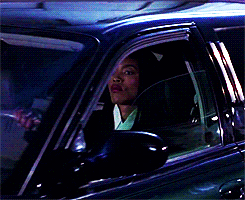Text
Mace’s character shows that black females are more than capable of having a heroic role in film. This really emphasized the lack of leading roles for black females in the industry. In the end, Lenny could not have been successful without Mace.
Mace > Faith
In the reading for this week, Jane Gaines’s essay White Privilege and Looking Relations: Race and Gender in Feminist Film Theory disputes different feminist theories, which she makes a point to state how some do not fully recognize the discrimination against women of color. Her reading also touches on women in film are made subject to the male gaze and how they play a bigger role in more than just “eye candy”. She states, “…women’s sexuality evokes an unconscious terror in men, then black women’s sexuality represents a special threat to white patriarchy; the possibility of its eruption stands for the aspirations of the black race as a whole” (p. 303) In the film Strange Days (1995), the audience gets to see and appreciate a powerful women of color. There were countless times when Mace came to Lenny’s rescue but one that stands out the most is when Philo sent him to the basement of his home and Lenny starts getting beat by three of his people. Mace comes in and single handedly fights off the three attackers and saves Lenny. Not at a single point was her character made to be sexualized by the male gaze. She just exuded raw strength and power. She exuded the “heteronormative” character we usually see played by men. She kept saving Lenny’s life, she had her emotions on lock, and she was the rational thinker. Mace embodied the idea Gaines had for a black women’s sexuality representing a special threat to white patriarchy.

7 notes
·
View notes
Text
This film definitely dwelled on the objectivity of women, with faith’s hypersexualization. I agree that this is a plague in most films and should be done to improve female’s roles in films to be seen as protagonists and not victims.
Viewing Response 14: Strange Days (1995)
In Jane Gaines’ “White Privilege and Looking Relations: Race and Gender in Feminist Film Theory”, she argues that women’s sexuality is focused in the experiences and form of the white woman and almost always in the context of man versus female in film. The view of spectators outside of the white heterosexual male gaze is overlooked and not considered. The subject/object conflict between white men and women in film also leaves out large portions of society. Women of other genders and sexualities like lesbians and individuals of other races, in specific black males and females are not considered for their viewing pleasures and relatability to the screen. This idea can be seen in Katheryn Bigelow’s film Strange Days (1995) which reinforces the white heterosexual gaze, even though it was directed by a woman. Though this film does include a strong black female lead, the only sexualized figures in the film were white women and they were present throughout the film. This film also highlighted the subject/ object relationship between Faith and Philo which can be seen in the scene where Lenny approaches Faith and Philo in the club. Philo makes it a point to say that he ‘took’ Faith from Lenny which reinforces the idea that she is an object to be taken. This subject/ object relationship between the males and females is not a gaze that can be related to by groups like lesbians, but plague almost every movie.

6 notes
·
View notes
Text
Strange Days(1995)
Jane Gaines believes that when most film discusses female sexuality the attention is on white women. She goes even further to assert that the gaze is only on white female heterosexual women. This isolates a large portion of the audience who is not white nor heterosexual. By withholding characters that society can universally identify with a film narrows its reach. Gaines states “black women’s sexuality represents a special threat to white patriarchy; the possibility of its eruption stands for the aspirations of the black race as a whole” (p. 303) she is claiming that black women’s underrepresentation in film is due to the looming threat of their powerful presence and filmmakers resistance toward giving them a fair share of screen time. In Strange Days(1995) Mace’s character was not seen as a romantic love interest until the very last scene. Lenny was preoccupied with Faith and was not able to realize his feelings for Mace. The final scene shows Mace as a strong character and refrains from hypersexualization by giving her a heroic role that a man would normally take on. The image of the police officers beaten Mace shows that she gets no advantage for being a woman and is seen as an equal. In the end Lenny and Mace end up together which is unusual according to Gaines’ essay.

5 notes
·
View notes
Link
No More "We Can't Find Any Black Female Writers": Here Are 62 Scribes in One Photo
14 notes
·
View notes
Link
Old Hollywood Feminist Movie Stars Who Were Seriously Ahead Of Their Time
13 notes
·
View notes
Link
Women Testify to Harvey Weinstein’s Decades of Sexual Abuse in Powerful New Film
15 notes
·
View notes
Link
These Three Emerging Female Screenwriters Are Ready To Be Heard
14 notes
·
View notes
Link
As Hollywood Embraces Diversity, Jobs for Female Directors Remain Sparse
14 notes
·
View notes
Link
Percentage of Female Directors in Hollywood Has Been Stagnant for 20 Years
14 notes
·
View notes
Link
Female Cinematographers, Not Content to Hide Behind the Camera
15 notes
·
View notes
Link
Hollywood Desperately Needs More Women Cinematographers
17 notes
·
View notes
Link
The data that reveals the industry’s “woman problem”
15 notes
·
View notes
Link
We need more diversity in film criticism, but 'Who is this movie for?' is the wrong question to ask
17 notes
·
View notes
Link
Feminists Say Only Male Critics Blasting ‘Captain Marvel’: Here Are Female Critics Panning It
18 notes
·
View notes
Link
Speaking Roles for Women Still Trail Far Behind Men, SDSU Film Study Finds
14 notes
·
View notes
Link
New Zealand Screen Summit to Tackle Diversity, Women's Rights
16 notes
·
View notes
Link
Marvel’s Debbie Berman is bringing ‘interesting female characters to the screen in movies people love’
15 notes
·
View notes